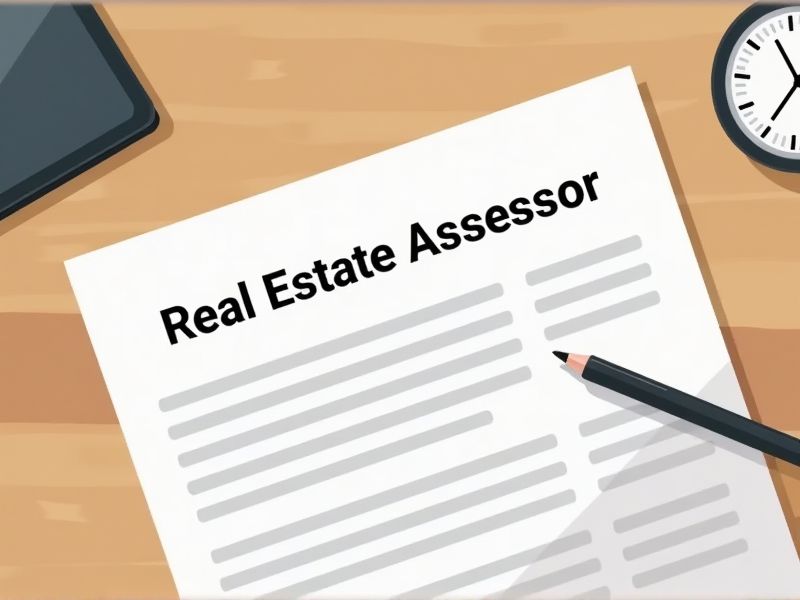
A Real Estate Assessor plays a crucial role in determining property values, a task requiring precise knowledge and adherence to governmental regulations. Due to the complex nature of property markets and fluctuating economic conditions, possessing certain certifications ensures that assessors have the expertise necessary for accurate evaluations. These certifications validate the assessor's competency and understanding of pertinent laws and appraisal techniques. Here are some essential certifications you might consider for becoming a Real Estate Assessor.
State-Licensed Residential Real Property Appraiser Certification
State-Licensed Residential Real Property Appraiser Certification ensures that real estate assessors meet standardized qualifications, leading to more accurate property valuations. Having certified assessors supports consumer trust by assuring transparent and fair property transactions. The certification process educates assessors in local market trends and legal requirements, reducing the risk of misvaluation. By adhering to a recognized standard, certified appraisers contribute to the stability of the housing market.
State-Licensed General Real Property Appraiser Certification
State-Licensed General Real Property Appraiser Certification ensures that real estate assessors possess the necessary knowledge and expertise to accurately evaluate property values. This certification establishes a standardized level of competency, which is crucial for maintaining consistency in property assessments across various regions. Inaccurate assessments can lead to incorrect tax calculations and financial discrepancies for both property owners and local governments. By obtaining this certification, assessors demonstrate their commitment to upholding industry standards and contributing to fair and equitable property taxation.
Certified Residential Appraiser
Certified Residential Appraisers play a crucial role in ensuring accurate property valuations, which directly influence tax assessments and lending decisions. Their expertise provides a reliable benchmark for real estate assessors to establish fair market values, thus preventing potential disputes between property owners and taxing authorities. A professional appraiser's skills also help identify unique property features that could affect value, allowing assessors to adjust their assessments accordingly. With comprehensive training and adherence to industry standards, certified appraisers contribute significantly to maintaining transparency and trust in the property tax system.
Certified General Appraiser
The presence of a Certified General Appraiser ensures accurate property valuation, which directly impacts fair tax assessments. This certification provides the expertise necessary to evaluate diverse properties, crucial for maintaining equity across varied real estate sectors. A Certified General Appraiser's advanced training leads to more precise data analysis, reducing the likelihood of disputes and appeals. Real estate markets rely on comprehensive appraisals to identify trends and make informed decisions, safeguarding both public and private interests.
MAI Designation (Appraisal Institute)
MAI Designation from the Appraisal Institute signifies a high level of expertise and professionalism, enhancing credibility in the real estate assessment field. This designation ensures assessors have undergone rigorous training and education, leading to more accurate property valuations. Employers and clients often prefer MAI-designated assessors because they are recognized for their ethical standards and comprehensive knowledge. Holding this designation can lead to better career opportunities and potentially higher income due to increased trust and demand for certified assessment services.
ASA Designation (American Society of Appraisers)
ASA Designation ensures a high standard of competence and ethical practice, directly influencing the accuracy and reliability of real estate assessments. This designation provides a framework for consistent evaluation methods, leading to more equitable property tax assessments. Appraisers with ASA credentials have demonstrated expertise, which builds trust with clients and stakeholders in property valuation matters. Regulatory compliance in real estate often requires such credentials, which can limit liability and enhance professional credibility.
CVA - Certified Valuation Analyst
The Certified Valuation Analyst (CVA) designation equips real estate assessors with advanced skills in accurately determining property values, which leads to more precise and equitable tax assessments. CVA training enhances the assessor's ability to analyze market trends and financial data, improving decision-making in property valuations. Holding a CVA credential often increases an assessor's credibility, fostering trust with clients and stakeholders who rely on expert valuations. CVA standards require continuous education and ethical compliance, ensuring assessors maintain high professional standards in their practice.
CCIM - Certified Commercial Investment Member
The CCIM designation arms a Real Estate Assessor with advanced techniques in investment analysis, improving the accuracy of property evaluations. Possessing the designation signals to clients and employers a higher level of expertise in commercial real estate, potentially leading to better career opportunities. The comprehensive curriculum enhances critical thinking skills that are essential for assessing market trends and property performance. Networking opportunities available through CCIM membership can also provide valuable industry insights and support.
CAE - Certified Assessment Evaluator (IAAO)
The CAE designation ensures that real estate assessors have advanced expertise in property valuation, leading to more accurate and fair property assessments. Enhanced accuracy in assessments can contribute to equitable tax distribution among property owners. Certified assessors with CAE credentials demonstrate a commitment to maintaining high professional standards, increasing public trust in valuation processes. The designation also equips assessors with current knowledge of industry trends and practices, which can improve efficiency in appraisal activities.
GISP - Geographic Information Systems Professional Certification
GISP certification ensures real estate assessors possess advanced skills in geographic information systems, enabling accurate property evaluations. Certification guarantees the assessor meets industry standards, leading to increased trust and credibility in their assessments. The use of GIS technology aids assessors in making data-driven decisions, enhancing the precision of property valuations. Certified professionals often experience career advancement opportunities and higher earning potential within the real estate sector.
Summary
Acquiring certifications as a Real Estate Assessor can enhance your credibility and boost your professional reputation. Certifications often lead to increased opportunities for career advancement and potentially higher income. A strong grasp of specialized knowledge and industry standards is generally achieved, improving your ability to make accurate property assessments. The overall trust in your evaluations typically rises among clients and stakeholders, further expanding your business prospects.
